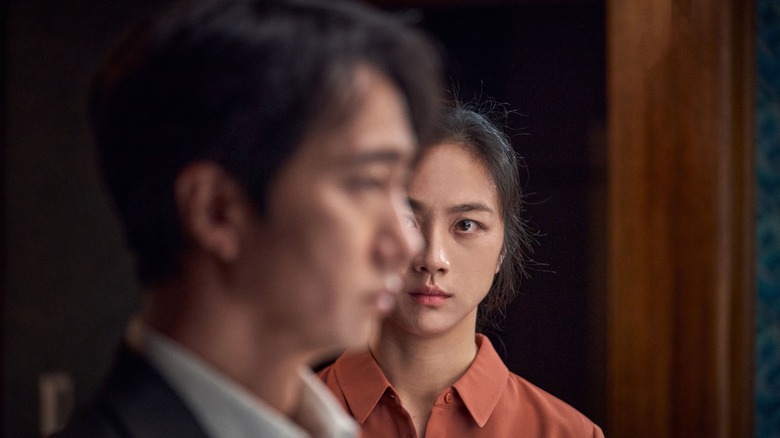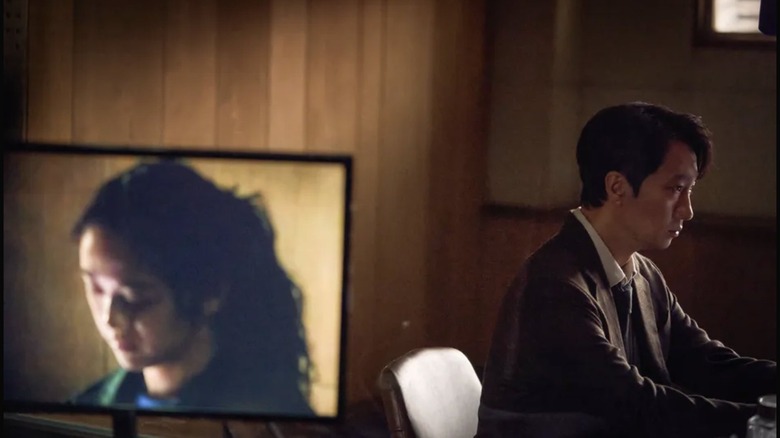Three Years After Parasite's Big Win, The 2023 Oscars Overlooked Another Korean Masterpiece
Today's Oscar nominations announcement brought an end to months of speculation among film fans and, of course, the start of an even more contentious period leading up to the actual ceremony itself. Naturally, that's all part of the fun surrounding this time of year, but one can't completely deny the reality that the Oscars truly mean something important ... even if its origins point toward a much different conclusion. Smaller movies that otherwise might've flown under the radar suddenly enjoy a much brighter spotlight. In a refreshing break from gatekeeping norms, casual audiences are invited to join in on the kinds of debates and celebrations that the average /Film reader seeks out on a daily basis. Look no further than the box office success that followed "Parasite" after winning Best Picture in 2020. And yet, just one glaring omission is enough to put a damper on things.
Although the overall results turned out more promising than most dared to hope, even that comparison to Bong Joon-ho's acclaimed film can't help but turn sour in light of this year's Oscar nominations. Only three years after it seemed like Hollywood was starting to recognize the incredible wealth of riches offered in South Korean cinema, the harsh light of reality in 2023 shows us just how far we have to go. Inexplicably, the brilliant "Decision to Leave" ended up being completely shut out from contention.
Snubs and surprises are no stranger to the Oscars conversation in any given year, but something feels particularly galling about the lack of any sort of recognition for "Decision to Leave." A thrilling, unpredictable, and deeply affecting throwback to the best of Alfred Hitchcock's career, the film offers much of what the industry typically loves to reward ... but failed to this time around. Frankly, it's baffling.
Take your pick!
The Academy could've easily rewarded multiple areas of "Decision to Leave" to an overwhelming degree.
Take the incredible visuals authored by cinematographer Kim Ji-yong, for instance. The painstaking compositions and realism-shattering moments of connection prevalent throughout the film have already made waves in certain corners of Film Twitter, displaying a master's appreciation for filmmaking fundamentals that works hand-in-hand with the twisting and turning story. As Jang Hae-joon investigates the suspicious death of a mountain-climbing hobbyist, the all-too-calm and shockingly lackadaisical demeanor of the victim's widowed wife Song Seo-rae only invites more and more interest. A detective yarn in the vein of classic romances and procedurals, the detective develops an ill-advised obsession with the suspect that spirals with as much chaotic precision as the blocking and framing that quite literally boxes the character in at times.
If that's not enough, there's the deceptively nuanced performance by actor Tang Wei. Saddled with a classic archetype that typically shuns any deeper exploration — a femme fatale's inherent sense of unknowable mystery is part of the appeal, after all — Tang Wei adds all sorts of fascinating touches that only enhance Park Chan-wook and Chung Seo-kyung's script. Though gifted with some absolutely killer lines ("The moment you said you loved me, your love is over. The moment your love ends, my love begins"), Tang Wei communicates even more with only the flicker of her eyes, a quirk of a smile, the hint of innocence and malevolence in equal measure. Acting nominees tend to go to the showiest displays, but it's criminal that this co-leading performance has gone unnoticed.
Every filmmaking choice made in "Decision to Leave" reflects the confidence and storytelling acumen of a filmmaker of Park Chan-wook's caliber, but his latest came up short there, too, denied the coveted Best Picture nomination.
Suspicious motives?
The symbolic push and pull between the mountain and the sea makes up a large part of the central conflict in "Decision to Leave," but not even the main players involved could've anticipated the real obstacle the film would be forced to contend with: the whims of awards voters.
It's hardly worth rehashing director Bong Joon-ho's passionate appeal to look beyond the "one-inch tall barrier" of subtitles and open up an entire world of storytelling at our fingertips, but that's one aspect that feels impossible to overlook when conducting a post-mortem on "Decision to Leave." Remember, for all the glitz and glamor involved in these ceremonies, every award and accolade comes down to the simple matter of official voters bothering to leave their comfort zones and actually seeking out any and all worthy entries. When the parameters for what counts as "Oscar-worthy" is left up to every individual to define on their own and given the widely-publicized demographics making up the bulk of Academy voters, it's easy to understand why certain kinds of movies (read: international films with non-white casts) would be left out in the cold. The surprise Best Picture win for "Parasite," as it turns out, was an exception to the rule.
But if there's one major positive to be found even in the midst of unforgivable Oscars snubs, it's this: Even the films that failed to make an impact with the gatekeepers of the industry still provide a perfect opportunity to bring attention to them. If you haven't yet watched "Decision to Leave," consider this a call to arms to head on over to MUBI (if you're not a subscriber, you can currently grab a free trial here) and experience Park Chan-wook's latest masterpiece for yourself. Unlike the Academy voters who may or may not come to discover their egregious mistake in due time, you won't regret it.


